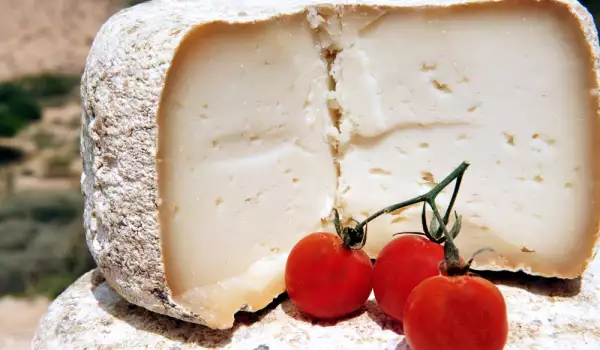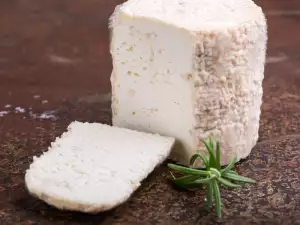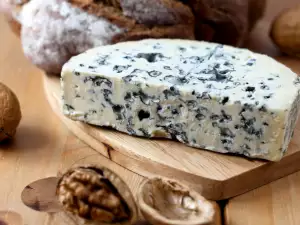For many people goat cheese is a gourmet experience for the senses, for others - a traditional aroma and flavor, a fond memory of grandmother's village. For others, it is a product that has no place on their table.
Among dairy lovers, goat cheese is classified as a delicacy. These mixed evaluations cause interest in this type of dairy product.
Production of goat cheese
Cheeses of this type are produced from fresh goat`s milk according to the traditional recipe, which includes the addition of spices. After soaking the dairy mixture, the whey is strained and the resulting curd is pressed well. The pressed mass is then cooled and placed into a mold.
Unlike cow`s cheese, the goat's cheese color is pure white.
Since this type of cheese does not cause allergic reactions, even babies up to eight months old are allowed to eat it.
For products of this type, the calorie content is not high, on average it is 290 kilocalories per 100 grams. Because of this, goat cheese is often used as a light food during diets.
This delicacy is also characterized by a low percentage of fat and can be made in hard, soft or curdled form.
Nutritional value of goat cheese
The nutritional content of goat cheese varies depending on the processing method used. All types of goat cheese are rich in useful substances such as healthy fats, proteins, vitamins and minerals. A 30-gram serving provides 6 grams of protein, along with minerals such as calcium, phosphorus and copper, which are essential nutrients that support bone health.
In addition, goat cheese has healthy fats, including fatty acids. They create a feeling of satiety and help reduce weight. This type of cheese has significantly fewer calories than other types of cheese, including cow's cheese.
Benefits of goat cheese
1. It is easier and faster to digest than traditional cow's cheese
Goat cheese is digested in a different way than cow's cheese and this has a better effect on the digestive system. This is because goat milk products have a different protein structure and contain lower levels of lactose. About 70% of the world's population has lactose intolerance. This causes symptoms such as bloating, pain, gas and diarrhea.
Therefore, products made from goat's milk, including cheese, are a better choice for those with lactose intolerance. Goat milk products contain mostly A2 casein, which is a type of protein that has been shown to be a lesser allergen than A1 casein, causing dairy sensitivity symptoms in some people and inflammation in the gut.
2. It is a good source of probiotic
Goat cheese contains a wide variety of probiotics. Diets rich in probiotics promote digestive health, reduce inflammation and boost immunity. Goat cheese is a great source of probiotics because of its high fat content and firm texture, which protects the beneficial bacteria.
3. It is more filling than other types of cheese

Goat's milk contains unique fatty acids associated with countless health benefits. Products made from goat milk have anti-inflammatory properties and can even help reduce hunger. This happens due to the presence of fatty acids, which are quickly digested, provide a quick source of energy, ensuring satiety. This is an important factor that can help with weight loss.
4. Provides B vitamins, copper and phosphorus
Along with proteins and fats, goat cheese provides the body with elements such as phosphorus, copper, B vitamins, especially vitamin B6, as well as some iron. The combination of protein, calcium and iron supports bones.
You can get 10-20 percent of your daily intake of honey with just one portion of goat cheese. This is important for maintaining high energy levels. Copper is also the third most abundant mineral in the body and plays a role in skeletal health, hormone production, hemoglobin and red blood cells.
Phosphorus is the second most abundant element in the human body. Its benefits are for the metabolism, the synthesis of the main macronutrients and the control of muscle contractions.
5. It has less saturated fat and cholesterol
Goat cheese is low in fat compared to regular cow's cheese. The fatty acids also contain less cholesterol.
6. It has lower sodium content
The recommended sodium intake for adults is an average of 2, 300 milligrams per day, but it's better to limit it to under 1, 500 milligrams.
On the other hand, lack of salt in the diet is also a dangerous condition. So, a balance has to be found. Goat cheese makes this possible. It contains only 118 milligrams of sodium, while parmesan has 5 times as much - 511 milligrams per serving.
Health benefits of goat cheese
The useful properties of goat cheese are manifested in the following therapeutic areas:
- Contains a significant amount of lactic acid microorganisms. It contains about 100 types of beneficial bacteria that significantly improve the immunity.
- Goat cheese is well absorbed by the body and protects the digestive system.
- The presence of calcium makes it good for people with lesions of bone tissue and joints.
- Selenium contained in goat's milk accelerates oxidation reactions and prevents the appearance of dangerous tumors in humans.
- This type of cheese is also good for the body of the little ones.
- It is useful in preventing atherosclerosis, which is explained by the complete absence of cholesterol.
- It is a good remedy for preventing female diseases such as inflammation of the urethra and menstrual disorders.
- In a state of pregnancy, it is suitable, as its trace elements contribute to the full development of the fetus.
- Improves nutrition in men, as the phosphorus and proteins contained in it strengthen muscle tissue.
- Prevents urinary disorders in men.
- Cleans blood vessels and lowers blood pressure.
- The health properties of goat cheese are also manifested in its ability to maintain human skin in perfect condition due to its vitamin D content, as well as to strengthen hair, gums and nails.
- In cosmetics, white cheese is used as a base for masks applied to the face.
Contraindications and restrictions for consumption of goat cheese

Like other dairy products, this type of cheese also has contraindications. These limitations are related to the high acidity, which does not allow its use in the following cases:
- with gastritis;
- aggravated gout;
- peptic ulcer.
In case of allergic reactions, consultation with a doctor is necessary.
The greatest harm is possible from improperly prepared white cheese, which often leads to serious food poisoning.
If the cheese is purchased from a store, you must immediately record the date it was produced.
To prevent poisoning, the following recommendations should be followed:
1. After buying large portions of white cheese, it is best to store them in the freezer.
2. When made, the low-quality raw product can carry pathogenic bacteria into the human body.
3. Goat cheese must be made only from milk obtained from well-kept and healthy goats.
When raw, unpasteurized products are used, salmonella or tuberculosis infection are possible.
Tips for using and storing goat cheese
In nutrition, this product is added to almost every dish. Its hard varieties are used in combination with fig jam and served with coffee, tea or white wine.
It is most often served at the table in the form of a marinated product sprinkled with grated garlic or herbs.
The white cheese is also used to make sandwiches with French bread, mustard and ham.
To prevent air from getting in it, it is recommended to wrap large pieces of cheese in wax paper or polythene bags. It can also be stored in salt water.
Also check out some delicious Goat Cheese Recipe ideas.

















Comments